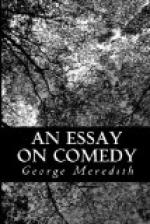The argument was conducted on both sides with spirit and earnestness, lightened here and there by frisky touches of the polysyllabic playful, reminding one of the serious pursuit of their fun by truant boys, that are assured they are out of the eye of their master, and now and then indulge in an imitation of him. And well might it be supposed that the Comic idea was asleep, not overlooking them! It resolved at last to this, that either Duke Pasquier was a scandal on our humanity in clinging to life so long, or that he honoured it by so sturdy a resistance to the enemy. As one who has entangled himself in a labyrinth is glad to get out again at the entrance, the argument ran about to conclude with its commencement.
Now, imagine a master of the Comic treating this theme, and particularly the argument on it. Imagine an Aristophanic comedy of THE CENTENARIAN, with choric praises of heroical early death, and the same of a stubborn vitality, and the poet laughing at the chorus; and the grand question for contention in dialogue, as to the exact age when a man should die, to the identical minute, that he may preserve the respect of his fellows, followed by a systematic attempt to make an accurate measurement in parallel lines, with a tough rope-yarn by one party, and a string of yawns by the other, of the veteran’s power of enduring life, and our capacity for enduring him, with tremendous pulling on both sides.
Would not the Comic view of the discussion illumine it and the disputants like very lightning? There are questions, as well as persons, that only the Comic can fitly touch.
Aristophanes would probably have crowned the ancient tree, with the consolatory observation to the haggard line of long-expectant heirs of the Centenarian, that they live to see the blessedness of coming of a strong stock. The shafts of his ridicule would mainly have been aimed at the disputants. For the sole ground of the argument was the old man’s character, and sophists are not needed to demonstrate that we can very soon have too much of a bad thing. A Centenarian does not necessarily provoke the Comic idea, nor does the corpse of a duke. It is not provoked in the order of nature, until we draw its penetrating attentiveness to some circumstance with which we have been mixing our private interests, or our speculative obfuscation. Dulness, insensible to the Comic, has the privilege of arousing it; and the laying of a dull finger on matters of human life is the surest method of establishing electrical communications with a battery of laughter—where the Comic idea is prevalent.




